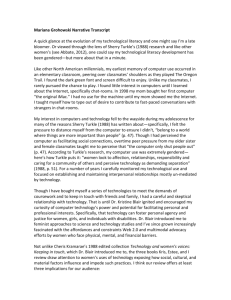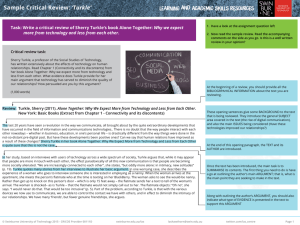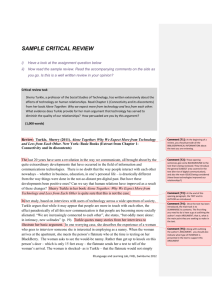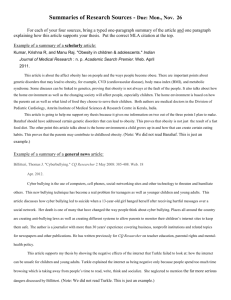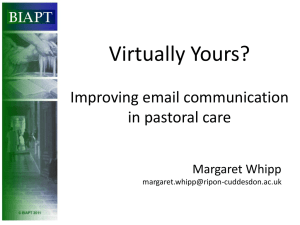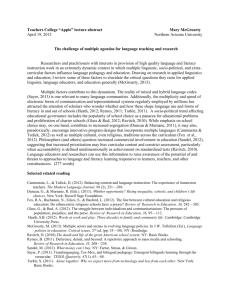SmithEssay2FirstDraft
advertisement
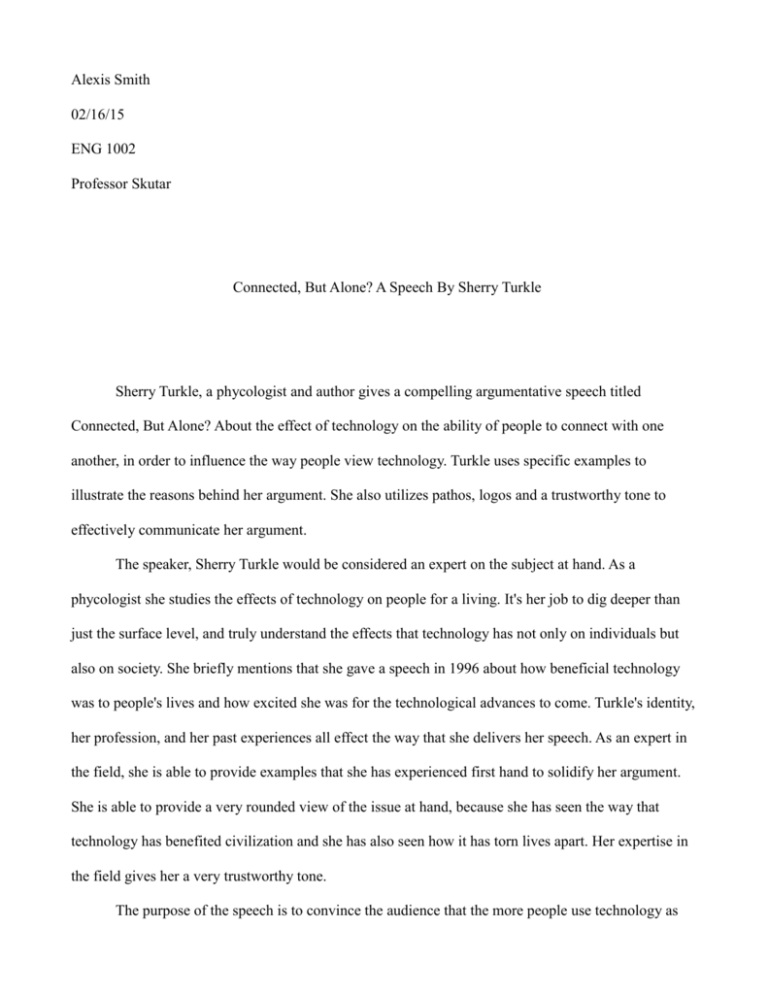
Alexis Smith 02/16/15 ENG 1002 Professor Skutar Connected, But Alone? A Speech By Sherry Turkle Sherry Turkle, a phycologist and author gives a compelling argumentative speech titled Connected, But Alone? About the effect of technology on the ability of people to connect with one another, in order to influence the way people view technology. Turkle uses specific examples to illustrate the reasons behind her argument. She also utilizes pathos, logos and a trustworthy tone to effectively communicate her argument. The speaker, Sherry Turkle would be considered an expert on the subject at hand. As a phycologist she studies the effects of technology on people for a living. It's her job to dig deeper than just the surface level, and truly understand the effects that technology has not only on individuals but also on society. She briefly mentions that she gave a speech in 1996 about how beneficial technology was to people's lives and how excited she was for the technological advances to come. Turkle's identity, her profession, and her past experiences all effect the way that she delivers her speech. As an expert in the field, she is able to provide examples that she has experienced first hand to solidify her argument. She is able to provide a very rounded view of the issue at hand, because she has seen the way that technology has benefited civilization and she has also seen how it has torn lives apart. Her expertise in the field gives her a very trustworthy tone. The purpose of the speech is to convince the audience that the more people use technology as form of socialization, a relief from loneliness, and a way to connect to the world, the less connected and the more lonely they become. She isn't trying to condemn technology, she is simply trying to persuade people to rethink the way they use technology. Turkle uses specific examples of situation in which most people believe that they are using technology to improve their lives and to create deeper relationships and stronger connections, when actually they are doing the exact opposite. One of the examples she uses is how people use their phones to text, email, or surf social media sites during business meetings, classes, dates and in many other situations that in previous years would have been deemed an inappropriate time to do these things. Although people think that they are privileged and better connected to the people around them because they are able to multitask and text while they are in class or scroll through Facebook while they are in a meeting, the connections and relationships in their lives are actually suffering as a result. When a person is constantly dividing themselves between technology and the Things taking place around them, they are not able to fully participate in and experience life. We invest ourselves in school, in work and in relationships but only in the parts that interest us. As soon as class gets boring or as soon as a relationship gets difficult we turn our attention elsewhere. According to Turkle people even go so far as to text at funerals. They use technology as a way to remove themselves from the grief. Another example Turkle uses in order to convince the audience that technology is harmful to relationships, is what she calls the Goldilocks Effect, which is when people have a “not to close, not too far, just right” mentality about relationships. People text, post on Facebook or twitter, but they fail to make deep connections or have real conversations. People become obsessed with editing themselves through text and social media and the more they do it the harder it becomes for them to have real and intimate relationships in which they share their true selves with another person. According to Turkle, people develop an “I share, therefore I am” mentality. People develop their identity through social media, through the Instagram picture that they edited to perfection or the Facebook status that they carefully thought out. Without social media many people don't even know who they are anymore. Turkle uses these examples to communicate her argument because people can relate to the situations presented. It gives people a chance to reflect and recognize how technology might have negatively affected their own lives and relationships. Audience members can think about how they got a bad grade in calculus because they were on their phone the entire class period, or how earlier they wasted two hours trying to take a new profile picture for Facebook, or how their past relationships have suffered because of a lack in communication. It's a very personal problem that Turkle is trying to shed light on, and as a result personal reflection is really the only thing that will bring about change. The audience for the speech is the generation that has grown up using technology. Most people born before the time of cell phones, texting and social media already recognize the social problems that have accompanied technological advances. Elderly people complain about how young people have no manners and don't know how to have an actual conversation with someone. Primarily 80's and 90's babies and their children as well would be the main audience for this speech. The people who suffered through dial up internet and giant cell phones with antennas and who have done their best to evolve with technology and have allowed it to become a bigger and bigger part of their lives as the years passed. These people also allowed technology to become a huge part of their children's lives, some have even bordered on having raised their children with technology. Some children get cell phones as young as 7 years old and have iPad and tablets instead of barbies and hot wheels. These are the people who need to understand the dangers of allowing technology to replace much needed connections and relationships. Turkle shapes her strategy to fit her audience by providing relatable examples of situations that these people encounter on a daily basis in order to help them understand how technology affects their own personal lives. She also makes an attempt to relate to the parents who rely heavily on technology in the opening line of her speech, “Just a moment ago my daughter texted me for good luck. Her text said, “Mom, you will rock”. I love this. Getting that text was like a hug” ( Turkle). One element that shaped the speech was the use of Pathos, or emotional influence in order to convince the audience. Turkle tells a heart wrenching story of an elderly lady in an assisted living facility who had lost a child. Turkle talks about how there are sociable robots who are created to be companions. They are designed to make people feel as if they are understood. According to Turkle the robot put on a pretty good show, it looked up at the elderly woman, and seemed to be following the conversation. But that woman was pouring out her life, and trying to makes sense of such intense and complicated feelings while talking to a machine that had no feelings. Turkle said, “People experience pretend empathy as though it were the real thing. During that moment when that woman was experiencing that pretend empathy I was thinking, “That robot can't empathize. It doesn't face death. It doesn't know life”. And as that woman took comfort in her robot companion, I didn't find it amazing; I found it one of the most wrenching, complicated moments in my 15 years of years of work” (Turkle). This story was clearly meant to have an emotional effect on the audience. Everyone has known loss of some kind, and everyone has a deep desire to be understood. Therefore a story like that would cause the audience to reflect on these feelings and recognize that fake empathy, fake connections and fake relationships don't meet human needs. Turkle tells another pathos infused story, about a business man who feels that he no longer has colleagues at his place of work. He claims that all of his coworkers are far too busy checking their email, and he doesn't want to interrupt them. He never stops buy to talk to them and he never calls them. Then the story takes a turn, “But then he stops himself and he says, “You know, I'm not telling you the truth. I'm the one who doesn't want to be interrupted. I think I should want to, but actually I'd rather just do things on my blackberry”. This story has an emotional effect on the audience, and causes them to pity the poor man isolated and alone in a world of technology. However it also causes them to reflect and to realize that although it may seem that the world is shutting them out, they just might be the ones shutting the world out. The genre of the speech is a persuasive or argumentative text. In a persuasive speech the author's goal is to convince audience that the opinion presented is correct. As I mentioned earlier, the purpose of Turkle's speech is to convince the audience that technology can have a negative effect on people's lives. A persuasive speech should state a thesis or argument, it should then provide background information about the subject, provide solid reasons that support the argument, and it should acknowledge counter arguments. Turkle identifies her argument early on in her speech, “Why does this matter? It matters to me because I think we're setting ourselves up for trouble – trouble certainly in how we relate to each other, but also trouble in how we relate to ourselves and our capacity for selfreflection” ( Turkle). She gives a sort of summery of behaviors that have resulted from people using technology as a substitute for real relationships and connections, “So just to take some quick examples: People text or do email during corporate board meetings. They text and shop and go on Facebook during classes, during presentations, actually during all meetings. People talk to me about the important new skill of making eye contact while you're texting. People explain to me that it's hard, but that it can be done. Parents text and do email at breakfast and at dinner while their children complain about not having their parents' full attention. But then these same children deny each other their full attention” (Turkle). Turkle provides many solid reasons to support her argument, most of which are products of her own personal experiences, for example, “Texting, email, posting, all of these things let us present the self as we want to be. We get to edit and that means we get to delete, and that means we get to retouch, the face, the voice, the flesh, the body—not too little, not too much, just right. Human relationships are rich and they're messy and they're demanding. And we clean them up with technology. And when we do, one of the things that can happen is that we sacrifice conversation for mere connection. We shortchange ourselves. And over time we seem to forget this, or we seem to stop caring” (Turkle). Turkle acknowledges the counter argument that technology can be beneficial by suggesting that it's not technology itself that is negative, it's the way we use it, “We're smitten with technology. And we're afraid, like young lovers, that too much talking might spoil the romance. But it's time to talk. We grew up with digital technology and so we see it as all grown up .But it's not, its early days. There’s plenty of time for us to reconsider how we use it, how we build it. I'm not suggesting that we turn away from our devices, just that we develop a more self-aware relationship with them, with each other and with ourselves” (Turkle). In conclusion, Turkle's speech, Connected, But Alone? Is a persuasive speech that serves the purpose of convincing the audience that technology is replacing real relationships and connections with a false sense of community and connection through texting and social media? The speaker, Sherry Turkle is a phycologist and she studies the effects of technology on people. The audience for the speech is the generation of people who grew up using technology and are raising their kids with technology. Turkle seeks to persuade her audience using specific examples of the effects of technology that they can relate to, stories that provoke emotion, and her trustworthy tone as an expert in the field. Works Cited Turkle, Sherry. "Connected, But Alone?" Oral Presentation.TedTalks.com. Web. 2 Feb. 2015.
